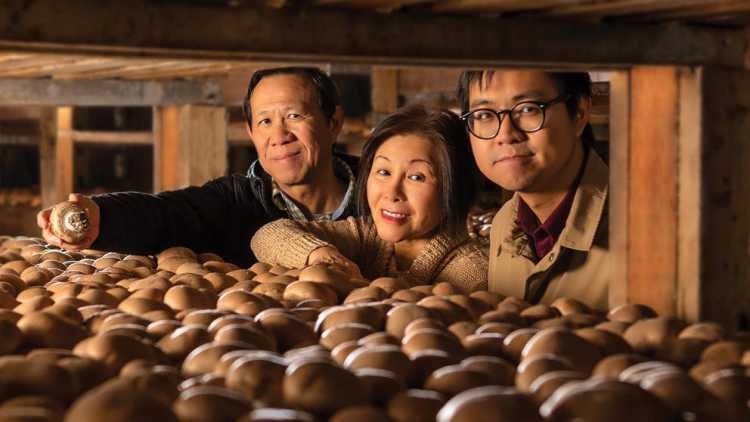Simple formula fuels mushroom success

2020 marked the 40th anniversary of Tan Truong’s arrival in Canada.
Like thousands of other Vietnamese refugees, in 1980 he made a treacherous journey across the Pacific Ocean in search of a new life that took him to the shores of British Columbia. With no knowledge of English, Truong relied on a staunch work ethic to find his way. His Canadian journey started with work as a chicken catcher on a poultry farm, but he soon found his way to a mushroom farm.
Truong still works on a mushroom farm, but things have certainly changed. In four decades, he became founder, president and CEO of Abbotsford, B.C.-based Ross Land Mushroom Farm. Today, his farm produces 30 million pounds of mushrooms annually and generates $83 million in sales, including products marketed under its Farmers’ Fresh Mushrooms brand.
Work harder, work smarter
Truong believes two simple rules have fuelled Ross Land’s success – work harder and work smarter. “We don’t have any secrets,” he says. “If there’s any difference, I think we work harder. We work as a team and everybody’s voice is important.”
He proudly explains how his harvesting employees can make a difference. “They know their job better than the management. They can speak to us any time about their concerns and offer opinions to improve production,” Truong says. Ross Land’s secret weapon, however, is likely Truong himself. He lives on the farm site and admits that he is committed to his job all day, every day. “Everything is my job and everybody else’s job is my job, too,” he says.
Working smarter for Truong includes greater use of innovation and mechanization. After working for several years on a chicken farm, Truong moved to Vancouver where he studied to become a machinist. With a mechanized mindset, he then returned to the Fraser Valley to work on a mushroom farm. Before long he and a partner started to build the Ross Land mushroom operation.
The farm’s main location boasts four mushroom production barns, a composting facility and a warehouse. The business also extends to supplying compost for other mushroom farms, which brings with it the exclusive right to purchase mushrooms from these growers.
European methods
Innovation has played a key role in the growth of the operation, explains Truong. When he started the farm in 1995, he realized that North American mushroom technology was 10 years behind that used by European producers. The biggest European advantage was the technology they used to make compost, a combination of manure and straw, which forms the foundation of mushroom production.
The farm reduced its mushroom production cycle from 10 weeks to seven and a half, [and] later … to five.
When Ross Land started growing mushrooms, its compost was produced more than a three-hour drive from the production barns. Trucking was expensive and Truong looked for ways to minimize cost and increase compost production efficiency on the farm.
In Europe, Truong learned of a better composting method: it incorporated pasteurization and a conditioning process to remove ammonia, which improves mushroom production. Truong admits that early efforts to adopt the composting system didn’t go as he had hoped, but they learned from their mistakes. When the kinks were ironed out, the farm had reduced its mushroom production cycle from 10 weeks to seven and a half weeks. Later, Ross Land would incorporate more innovative composting techniques, further reducing production cycles to five weeks.
Innovation is key
As the business continues to grow, Truong sees both opportunities and challenges ahead. The biggest hurdles come in the form of food safety, environment and labour demands. He’ll continue to leverage innovation to tackle food safety demands for cooling and refrigeration, adjusting and adapting where needed. Robots will also play a role in producing and harvesting mushrooms as labourers willing to work on mushroom farms, and throughout all sectors of agriculture, become more difficult to find.
Truong, however, is not the kind who is easily deterred. “We’re very excited about the mushroom business. People want more vegetables and mushrooms are one of the main items on their table,” he says. Overall, the mushroom sector contributes close to $1 billion a year to the Canadian economy, reports Mushrooms Canada.
Truong also notes that mushroom production consists mainly of agricultural waste – straw and manure. He proudly points out that mushroom growers combine this waste to produce a nutritious food that provides jobs for many new Canadians. “We do our best to put two waste products together to become a good thing for life and employ a lot of people.”
An enticing inheritance
Farmers’ Fresh Mushrooms produces a wide range of conventional and specialty mushrooms for the North American retail and wholesale food industry, explains Tim Truong, Tan’s son who joined his father and mother, Hue Huynh, in the Ross Land business.

Tim grew up on the farm, and like many farm kids, decided he didn’t want to work in the family business and set out on his own path. But after earning a law degree and practicing for a few years, he decided to head home to the farm.
When asked for one word that best describes his father, Tim offers up “respect.” He says you can’t help but respect Tan’s work ethic and his 40-year journey, but what makes the farm’s founder unique is his ability to respect and value others.
“The old man said I should get a real job,” Tim chuckles. “The business has grown so much and my dad has a great team. I just have to be part of it.”
Always keep improving
Within the Truong’s success are some smart business principles that can be applied to almost any farming operation
Invest and work hard: The greater your investment, the better and more bountiful your harvest. Investment may be physical (putting in the hours) or mental (an awareness of where improvements could be made).
Innovate: Keep eye on new and evolving production trends – locally and globally. Implement those that improve efficiencies.
Adapt: When changes don’t produce expected results, evaluate what’s working and what isn’t and make adjustments. Know your numbers before you make any changes and measure all progress.
Reduce loss and waste: Reducing loss and waste may mean a small change (adding wheels to a cart) or something larger (cutting out a three-hour drive for compost). Knowing where loss is occurring is the first step.
Count on your team: Your employees are your greatest asset. As they learn more about the business and its intricacies, they may also have valuable suggestions for improvements. Ask, listen, learn and implement – and give credit to those who helped make a positive difference.
From an AgriSuccess article by Bernard Tobin.

Learn how increasing your business literacy can help you better manage your farm and make informed decisions.